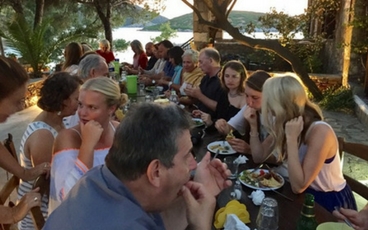Holistic Holidays
Skyros' holistic approach goes back to the ancient Greek idea of holiness. The Greeks did not make a sharp distinction between mind and body. Physical, moral and intellectual excellence, all described by the single word arete, were considered indivisible.
The gymnasiums, where health and fitness were cultivated, were centres not only of physical education but also of cultural activities and mental exercises. Indeed, the programme of the Olympic Games included, alongside the athletic contests, music competitions, communal singing, oration by distinguished philosophers and recitals by poets and historians.
Illness, like health, was viewed holistically. For Hippocrates, the father of medicine, the doctor’s role was simply to assist the natural self-healing process, taking account of the way a person lived, anyone’s natural and social surroundings, including even the way the wind was blowing.
Balance, proportion and symmetry were considered the ruling principles of health as of architecture, prose or mathematics. Extremes of any kind, whether in the form of food fads or of religious asceticism, were frowned upon.
The life of the individual was also inseparable form the life of the community - the polis (city state). The Athenian citizen participated in all aspects of government activity, and the polis, in turn, was expected not simply to run its business efficiently, but in doing so to stipulate the intellect and satisfy the spiritual aspirations of its citizens. Startlingly, preempting modern psycho-political theories, Athenian statesman Pericles said in the 5th century BC that ‘the delight we daily take in all these things helps to banish melancholy.’
The Skyros experience is rooted in the ancient Greeks’ balanced integration of mind, body and spirit, nature and community. Hence alongside the many physical activities, from yoga to climbing and windsurfing, the programme includes courses in music and art and talks on contemporary issues. Encouraging solidarity rather than competition, the daily life of the Centres is founded on sound community principles, and looking forward to a more promising world, it facilitates the self-searching and self-healing process.
See our Holistic Holidays here
 |
 |
 |









